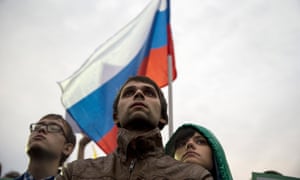Russia funds Moscow conference for US, EU and Ukraine separatists
Conference includes representatives of Sinn Féin and radical black power Uhuru Movement despite Kremlin crackdown on its own dissidents
 A young couple attend an opposition rally in Moscow. The Kremlin has helped to fund a conference for European and US separatists. Photograph: Pavel Golovkin/AP
A young couple attend an opposition rally in Moscow. The Kremlin has helped to fund a conference for European and US separatists. Photograph: Pavel Golovkin/AP
Alec Luhn in Moscow
The Russian government has helped fund a conference in Moscow to bring together separatists from the United States and eastern Ukraine, despite cracking down on its own dissidents.
Opposition to the US and European Union was the factor unifying the assortment of guests at the “Dialogue of nations: the right to self-determination and the construction of a multipolar world” conference at the President hotel in downtown Moscow on Sunday.
Among international participants were representatives of Sinn Féin, the Catalan Solidarity for Independence party and Italy’s European Communitarian party Millennium, as well as separatist groups from Hawaii and Puerto Rico and the US-based radical black power Uhuru Movement.
Several representatives also spoke on behalf of the Russia-backed Donetsk and Luhansk people’s republics in eastern Ukraine, where the conflict between the pro-Russian rebels and the Kiev government has killed more than 6,500 people since April 2014.
The island’s classification as a US territory complicates something as simple as bankruptcy filings, prompting many to wonder if statehood is the best option
Although no Kremlin officials were present, state civic chamber member Georgy Fyodorov came to argue that: “America is an instrument, a huge hooligan or policeman that along with England is executing the will of global mega-corporations.”
Speakers at the conference vigorously blamed Washington for a host of ills including the war in eastern Ukraine and the refugee crisis in Europe, but did not discuss the Kremlin’s own role in these events.
According to organisers from the Anti-Globalist Movement of Russia, funding for the gathering was provided in part by a state grant from the National Charity Fund, which was founded as the National Military Fund in 1999 by then-PM Vladimir Putin. The National Charity Fund gets money from large state-owned and public companies and oligarchs. Participants were offered airfare and accommodations.
While Putin’s government has cracked down on “foreign agents” at home, it has also promoted division within Europe and the United States. But conference organiser Alexander Ionov denied that Moscow could be using the conference to forward its own political goals.
Despite the fact that Russia has made no secret of its arms shipments to Bashar al-Assad’s regime in Syria and has reportedly provided weapons and funding to the eastern Ukraine rebels, Ionov argued the United States was inciting these conflicts in its own interests.
“If we look at the crisis in Syria, the United States delivers weapons while Russia delivers humanitarian aid. If you look at the crisis in Ukraine, the United States delivers weapons while Russia delivers humanitarian aid,” Ionov said.
The Kremlin has said truck convoys to Ukraine and military flights to Syria have brought only food and supplies, although satellite imagery, video and photographs from Syria have pointed to a Russian military buildup there in recent weeks.
The Russian government has recently been cracking down on activists at home with a law against separatism that Putin signed at the end of 2013.
Last week the Tatar activist Rafis Kashapov was sentenced to three years in a prison colony on charges of separatism and hate speech for sharing anti-Putin social media posts. The Moscow-based Sova Centre, which studies extremism and hate crimes, called his conviction a violation of free speech, and human rights organisation Memorial declared him a prisoner of conscience.
Also on 15 September, a court in Krasnodar began hearing the case of local opposition activist Darya Polyudova, who was detained after a “March for the Federalisation of Kuban” in August 2014 and charged with separatism.
Ionov said these activists were not anti-colonial separatists like those at the conference and argued the Russian government had to be able to defend itself from opposition groups funded by western organisations. Several Russian NGOs who received international grants have been forced to close under a 2012 law regulating “foreign agents”.
Irish participants at the conference told the Guardian that they had no Kremlin links and were simply taking an opportunity to promote their cause. Sinn Féin member Diarmaid Mac Dubhghlais compared the eastern Ukraine conflict to the “Ireland of years ago”, arguing that the pro-Russian rebels were fighting a “fascist government” in Kiev.
“In Ireland, we accepted help from Muammar Gaddafi,” said Michael McLaughlin of the Irish Republican Socialist party. “When you’re in a battle for national liberation you don’t question the background of the people helping you.”
Meanwhile, several thousand people attended a rally “for changeability of government” on Sunday organised by the liberal opposition, even though local authorities only allowed it to be held far outside the city centre. The opposition failed to win any seats in regional elections last weekend after it was disqualified on questionable grounds in all but one province.
The north American groups at the conference focused on their struggle against the poverty and environmental destruction they said was caused by US colonisation. While Ramón Nenadich of the Puerto Rican group Borinken and Lanny Sinkin, a representative of the self-declared King Silva of Hawaii, said their struggle was non-violent, Omali Yeshitela of the Uhuru Movement said American imperialism could not be overcome by peaceful means.
“We call on you to recognise the right of African people to engage in armed defence against American colonialism, and we would like to express our profound appreciation to the Anti-Globalisation movement of Russia,” he told attendees.
“We are convinced that we are on the right side of history, we are convinced that we will win, we are convinced that we are winning. Uhuru!”

